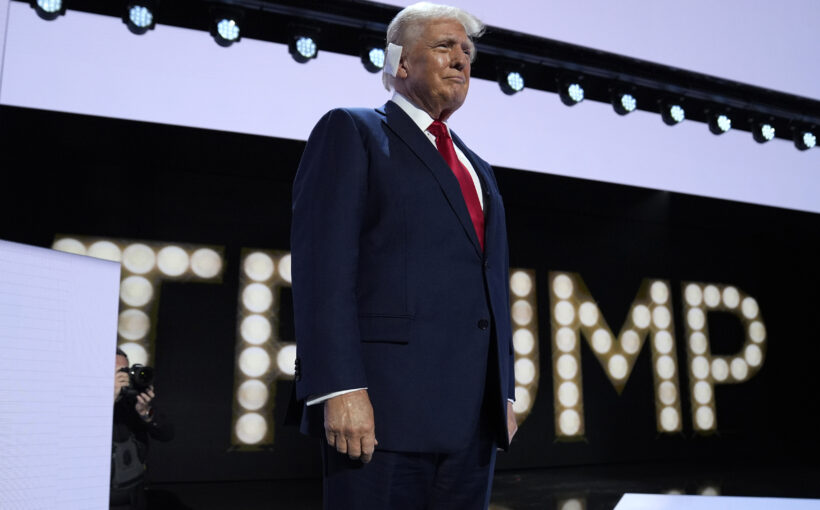US border policy remains a key electoral issue for Democrats and presidential nominee Kamala Harris as she approaches the November election.
According to a recent Gallup poll, 77% of Americans believe the southern border is experiencing either an ongoing crisis or is a major problem. Meanwhile 55% wish to see less overall immigration, 53% support expansion of the border wall and 63% would support the president temporarily closing the border to asylum seekers when the border is “overwhelmed”.
The issue is an important one in border states, especially in those such as Arizona, where polls show an incredibly tight race.
Those who rate immigration as a top issue favour Donald Trump over Harris, and in one new poll voters say that Trump will be far more successful than Harris at securing the border.
Joe Biden’s initial border policies continued some entry restrictions brought in by Trump’s administration, which had restricted border entry during the heights of the pandemic. But Biden also opened new pathways for legal migration. This included expanding temporary protected status, which expedites work permits for specific populations fleeing violence or disasters from countries such as Haiti or Ukraine.
Biden’s congressional border bill failed to get through the Senate in June. In it, he aimed to speed up the asylum process, revoke visas of the bosses of companies that work with illegal immigrants, and add executive authority to shut border access.
Harris has confirmed that she wants to resurrect the Biden administration’s border bill despite criticism from advocacy groups such as the American Civil Liberties Union. It argues that it would cut off any access to asylum protections for the vast majority of people arriving at the US-Mexico border, and disregard human safety.
Democratic shift?
So how and why did Democrats shift their border policies so drastically when they had been openly against Trump’s border restrictions during his presidency – and what does this mean for potential border policies under a Harris administration?
Over the past decade, people from Central and South America have been fleeing for a variety of reasons, including the recent chaos in Haiti, the effect of harsh economic conditions in Venezuela and organised crime. The United Nations High Commissioner for Refugees estimates that the number of forcibly displaced people in the region is expected to reach 25 million.
Along with this, the US southern border has been inaccurately framed as the primary means through which fentanyl has entered the country and caused the opioid crisis. These two factors have linked asylum-seekers with fentanyl despite US citizens being the main smugglers of fentanyl into the country.
The Biden administration attempted to address some of these issues by appointing Harris, at the beginning of its term, to explore the “root causes” of migration from Central America. This included directing private sector investments towards countries from where large numbers of asylum seekers were fleeing. Research suggests that this does little to address organised crime or governance issues.
Customs and Border Protection reported in June that 2024 saw the fewest border crossings since 2021. The Harris campaign has seized on this to claim the Biden administration’s approach has been the correct one. A closer looks, however, suggests there are many different factors.
US Customs and Border Protection has increasingly restricted access to asylum as per the executive order, delaying those who can cross the border and need to claim asylum immediately. Mexico (among other states in Central America) has restricted northward movement towards the US border, including bussing people back to the south of the country.
Meanwhile, asylum-seeker deaths at crossing points within Central America and after crossing the US border have increased from 149 discovered remains in 2023 to 164 by August 2024. This would suggest that the root causes remain the same.
Asylum, border security, crime, and the opioid epidemic have been tangled into a single issue. National security and immigration are constantly linked. And this has led to the Harris campaign’s recent advertisements emphasising her “tough stances” on border crime.
This is in contrast to her criticism of Trump in 2018, when she called his border wall policy “un-American”. Despite past Democratic criticism of Trump’s harsh border restrictions, restrictive border policies have come from both parties.
Both parties claim that stronger enforcement and more rigorous vetting of asylum-seekers is needed, as well as expedited deportations and “safe third country” deportations. These positions still conflate asylum-seekers with criminals. Immigrant advocates have noted that the US’ asylum system is already one of the most complex in the world. Asylum cases often take years to decide.
The “remain in Mexico” policy, which forced asylum seekers to stay in Mexico while their asylum applications were considered, was implemented by the Trump administration during the pandemic and maintained by the Biden administration. Advocacy group Human Rights Watch argued that it endangered countless asylum seekers, putting men, women and children at risk of violence or death, while they waited for their cases to be heard.
Seeking asylum is both a national and international right. The first potential policy priority to ease the border pressure should be to simplify the asylum process and reduce the time it takes to resolve a case from several years to several months. Fortifying the border puts vulnerable lives at risk, regardless of which party proposes it. Shutting down the border would only put more lives at risk.
If the Harris campaign is serious about border policy reform, it must first look to ease and expedite asylum access instead of restricting it.
![]()
Eli Auslender does not work for, consult, own shares in or receive funding from any company or organisation that would benefit from this article, and has disclosed no relevant affiliations beyond their academic appointment.



